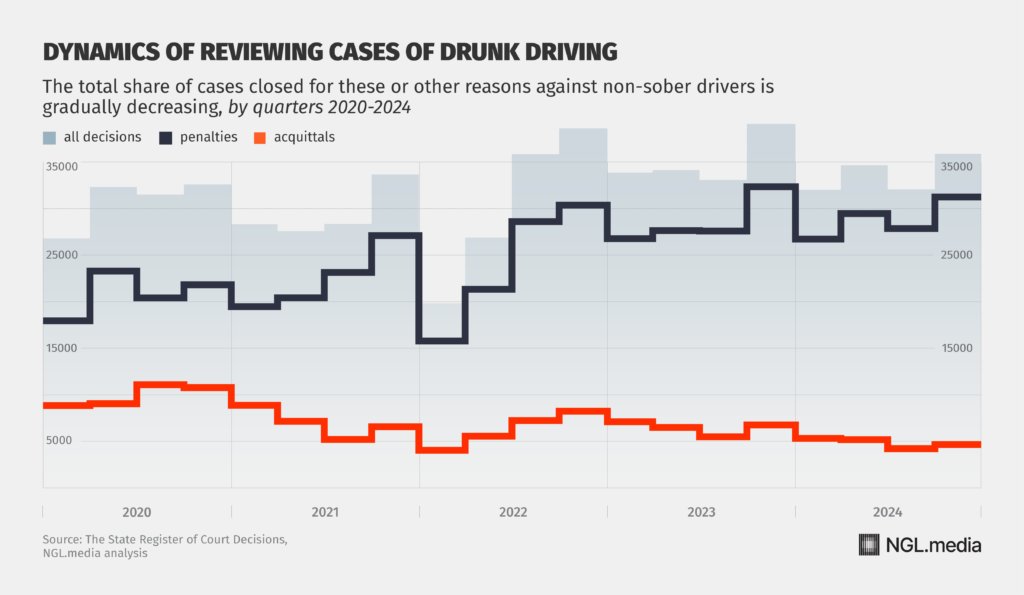Every year, tens of thousands of Ukrainians avoid punishment for drunk driving, even in cases when their offences have been documented and confirmed properly.
NGL.media analysed all the rulings of Ukrainian courts related to Art. 130 of the CUoAO the Code of Ukraine on Administrative Offences (drunk driving) for five years and found several dozens of judges who have been very lenient to drunk drivers, to put it mildly.
This research has become possible thanks to the participants of the NGL.media community, who have access to special content and possibilities.
Two years ago, Dmytro Poraiko, a resident of the Bukovyna town of Storozhynets, found himself in a very unpleasant situation – a car he was driving bumped into another vehicle. Nobody was hurt, but the narcologist of the local hospital confirmed that Poraiko was not sober, so the patrol police completed two on-site administrative reports – for drunk driving and the road accident.
Three weeks later, Dmytro Poraiko faced the court but got off with nothing more than a fright. Vasyl Buzhora, a judge of the Storozhynets district court, decided that though the accused hadn’t been sober, the patrol police officers didn’t present sufficient evidence to prove that it was Poraiko who had been driving the car. Instead, 15 minutes later, the judge declared him guilty of causing a road accident and imposed a fine of UAH 850. Thus, while considering two administrative reports for the same event, the judge took two opposite decisions.
The analysis of NGL.media demonstrated that Judge Vasyl Buzhora is generally very lenient to persons, accused of drunk driving. Over 50% of his decisions in the past five years have acquitted such drivers.
Over 20% of drunk drivers avoid punishment
Every year, drunk driving causes many road accidents. According to the data of the patrol police, last year, drunk drivers caused a thousand road accidents, which resulted in the death of 110 people and traumas for over 1,300 more.
Drunk driving is one of the most common administrative offences. For instance, Ukrainian courts considered over 167 thousand such cases last year alone. This problem has been getting worse ever more – in six recent years, the number of confirmed cases of drunk driving increased by 50%.
The NGL.media’s analysis of court rulings for five recent years demonstrates that about 22% of persons, accused of drunk driving, avoid punishment – they are neither fined nor their driver’s licences are revoked. And we managed to determine judges who acquit hundreds of such drivers.

We used the Unified state register of court rulings to collect statistical data. In the first stage, we singled out all the rulings of the courts of the first instance related to Art. 130 of the CUoAO for the period from January 1, 2020 till September 31, 2024 inclusive – a total of about 760 thousand rulings.
For further analysis, we selected 637.4 thousand rulings in which the judge had declared a driver guilty or closed the case. Then, we divided these rulings into two categories – “declared guilty” and “closed case” for each judge. Further analysis involved only the judges who issued at least 100 rulings related to Art. 130 of the CUoAO in five years. We found 2,215 such judges.
We also calculated the percentage of closed cases per each judge – the ones, in which the judge refused to declare a person guilty of drunk driving. This is how we found 63 judges whose percentage of closed cases in five years has been 50% or more.
Within ten recent years, the punishment for drunk driving has been made more harsh twice – in 2016 and 2021. Now, the minimal punishment envisages not only a fine of UAH 17 thousand but also the obligation of revoking the driver’s licence for one year. Repeated offence within a year leads to revoking the driver’s licence for three or ten years.
It is the threat of losing the possibility to sit behind a wheel that makes such drivers look for ways to avoid punishment.
How do judges close such cases?
While analysing court rulings, we defined two main grounds to close cases related to Art. 130 of the CUoAO – expiry of a legal investigation (one year since the moment of the offence) or absence of an event and elements of a violation.
The first method was popular till March 2021, when the investigation period was extended from three months to one year. Since then, there have been few cases, closed due to this reason.
Instead, in the four recent years, the most popular variant of closing a case is on the grounds of the absent elements of a violation. So, as a rule, the judges close cases because of errors, detected in the materials, submitted by the law enforcement bodies. And the subjectivity of the judge’s decision is practically boundless.
For instance, in Skvyra of the Kyiv region, Judge Oleksandr Kovalenko closed a case on drunk driving because he decided that the bodycam footage of a patrol police officer, submitted to him, was a copy, not an original. On the contrary, in Zhovkva of the Lviv region, Judge Mariana Oleshchuk fined a driver in a similar case. In general, NGL.media found hundreds of rulings in which judges considered copies of bodycam footage to be completely full-pledged evidence.
The abovementioned Judge Vasyl Buzhora acquitted a driver, who refused to undergo a medical examination for narcotics at the police’s request. In the judge’s opinion, the patrol police didn’t offer the man to have this test immediately on site. However, the disciplinary chamber of the High Judicial Council declared this ruling inappropriate since the rules of the Ministry of Internal Affairs require that the patrol police should direct drivers, suspected of narcotic intoxication, to a medical institution only.
Errors of law enforcement officers
Of course, sometimes patrol police make actual mistakes while composing and executing reports, which allows the accused of drunk driving to avoid punishment easily.
For instance, Judge Serhii Melnychenko from Dnipro closed the case against Kornelii Sobko, who drove a car being drunk for the third time that year, because the patrol police didn’t attach the evidence of previous offences to the case materials. Judge Bohdana Berkeshchuk from Kolomyia closed a case because the patrol police forgot to specify in their report that it was the accused who was driving the vehicle.
A unique judge from Dnipro
An absolute record holder among Ukrainian judges, considering cases related to Art. 130 of the CUoAO, is the chief justice of the Zhovtnevyi district court of the city of Dnipro, Vadym Honcharenko. In five recent years, he considered 3,644 cases of drunk driving, on average, three cases a day, which is twice more than the result for the next judge in terms of this index.
Judge Honcharenko is different not only because of the number of considered cases but also because of his unusual leniency to persons, accused of drunk driving. Within the analysed period, he closed 3,035 cases, which is over 83% of the total he had considered.
Honcharenko closes almost all the cases, referring to the absence of the elements of a violation but interprets the legal requirements in a rather loose way. For instance, he acquitted a driver, who had refused to undergo a check using a portable breathalyser and rejected the statements of the patrol police about the specific smell from the mouth and video footage as insignificant evidence.
Another remarkable example: though a driver agreed to have testing done on-site, and the breathalyser showed 1.96 ppm, Judge Honcharenko closed the case anyway because, in his words, the patrol police hadn’t explained to the accused what a breathalyser was and didn’t attach the device certificate and the device verification certificate to the case materials. In addition, in the judge’s opinion, the patrol police had to offer the driver to undergo an additional examination in a medical institution.
However, Svitlana Ilnytska, a member of the Public Integrity Council at the High Qualification Commission of Judges of Ukraine (HQCJ), explained to NGL.media that, in reality, after the testing using a portable breathalyser, the patrol police don’t have to offer an additional examination in a hospital, if a driver himself doesn’t insist on it.
Obviously, this leniency to drunk drivers couldn’t but lead to blunt misuse when this judge acquitted a driver, Danylo Holiakov, 12 times (!) when the latter was regularly stopped in the state of narcotic intoxication.
Vadym Honcharenko refused to talk to NGL.media.
Generally, the Zhovtnevyi district court of Dnipro, headed by Honcharenko, acquits 78% of drivers, accused of drunk driving.
Is there punishment for such judges?
It is actually possible to impact such judges, in particular, the complaints against their rulings are reviewed by the High Judicial Council. For instance, after the police appealed the ruling of Judge Vasyl Buzhora in 2024, the High Judicial Council brought the latter to disciplinary responsibility in the form of a warning. It seems to have impacted the judge since the share of the cases, closed by him, decreased three times – from 53% in 2023 to 14% in 2024.
As per Roman Maselko, a member of the High Judicial Council, anyone can file a complaint against a judge regardless of being related to the case in any way. The High Judicial Council can also dismiss a judge, but as for any violations while considering cases of drunk driving, it mainly means a warning or a reprimand.
“In these cases, one cannot always be sure that the judge has done it on purpose and not just made a mistake. But if there are evident features of [systemic] violations, it seems to me that an oral warning is not enough,” Roman Maselko admits.
The investigation, conducted by DEJURE Foundation, demonstrates that in 2024 [during the period from 02.11.2023 till 20.11.2024], the High Judicial Council considered complaints against 38 judges, 24 of whom were brought to responsibility – 20 warnings, three reprimands, and one temporary suspension.
The Public Integrity Council at the HQCJ checks judges as well. As a rule, it happens during the qualification evaluation or competitions for vacant positions. “If we see that a judge closes 20, 30, or 50 per cent of cases related to Art. 130 of the CUoAO due to expired terms, we send a conclusion about the untrustworthiness of the judge to the HQCJ,” says Svitlana Ilnytska, a member of this council. If the untrustworthiness is confirmed, the HQCJ directs a decision about dismissing a judge to the High Judicial Council.“However, the High Judicial Council often drags out their review of such judges and, as a result, lets them retire with honour [which entails a payment of the dismissal wage and receiving the judge’s pension],” Ilnytska says. In general, in 2024 alone, the state budget spent over UAH 5 billion for pensions to retired judges.
Find Your Judge
NGL.media checked the decisions of all judges who considered cases of drunken driving in 2020-2024. We sorted them by their loyalty to the defendants and show who is most likely to dismiss cases under Article 130 of the Administrative Code.
The author Maksym Pikho, editor Oleh Onysko, data analysis Nazarii Tuziak, translation Nelya Plakhota, cover Marta Kharkovets



